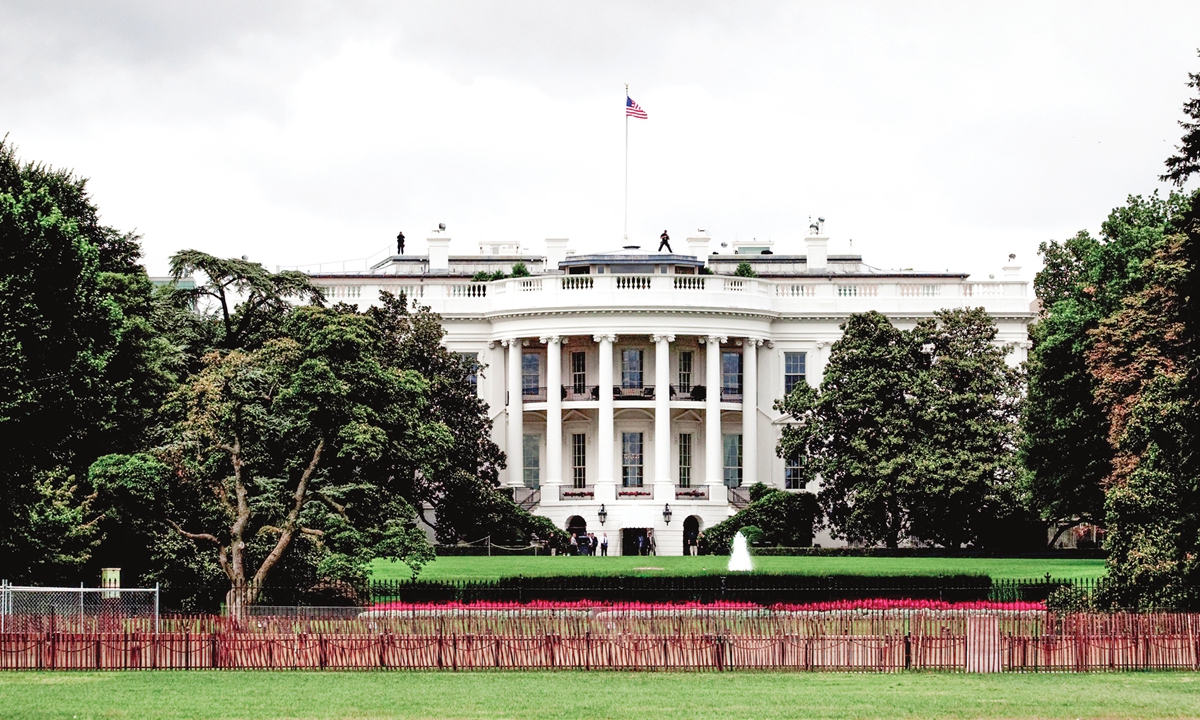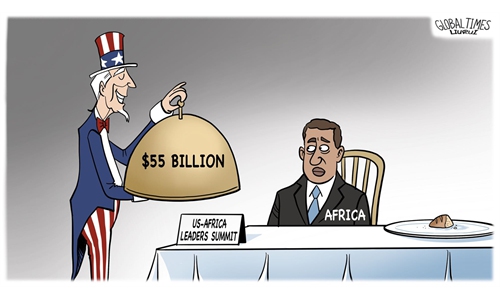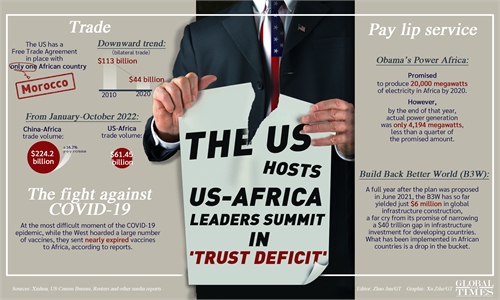US-Africa summit: how Washington’s confrontational foreign policy loses hearts and minds

The White House Photo: VCG
In August 2014, when then US president Barack Obama convened the first ever US-Africa Leaders’ Summit in Washington DC, he announced, among the very few outcomes of the three-day event, that the summit “will be a recurring event.” More than eight years and four months later, US President Joe Biden this week hosted the summit again in the US capital. Both in 2014 and now, US officials like to talk about the US’ “commitment” to Africa, but that time span doesn’t exactly show commitment.
That the US failed to fulfill its very basic promise of hosting the summit regularly for over eight years is just one aspect of Washington’s negligence of the continent. The summit is aimed at increasing US investment in Africa and trade with the continent, but needless to say, that did not materialize. Since the first US-Africa leaders’ summit, US foreign direct investment in Africa plunged from $69.03 billion to $44.81 billion in 2021, according to Statista, a global economic data provider. US imports from Africa remained basically flat during the period – from $34.61 billion in 2014 to $37.56 billion.
So when Biden invited 49 African leaders to Washington DC and declared that “the [US] is all in on Africa’s future,” it doesn’t carry much credibility. And that is unfortunate because Africa, as an emerging market economy with massive potential, does need a great deal of foreign direct investment from major economies, or as Obama put it in 2014, “the more the merrier.” But the world’s biggest economy is not able or willing to invest real money in infrastructure that is crucial for Africa’s future prosperity. If the US was actually helping to build roads, bridges, ports, schools and ports in Africa, Washington wouldn’t need a summit to demonstrate its “commitment.”
The summit has been awkward for Washington. It is obvious that US officials want very much to talk about China, but African leaders have made it clear that they are not at all interested in Washington’s cliché talking points and warnings about “Chinese influence.” That’s why we are seeing US officials tiptoeing around what they say about economic partnerships and investment, and what they really want to talk about – growing China-Africa cooperation.
The summit is clearly aimed at reassuring African leaders who are weary of Washington’s geopolitical tricks. US officials have been trying very hard in public comments to avoid the summit seeming to be about China, with US Secretary of State Antony Blinken saying that “this is also not about a competition with others. This is not about saying to our friends and partners, you have to choose. This is about offering a genuine choice, offering a genuine partnership.”
That all sounds nice. After all, Africa has the right and should be able to choose sound partnerships that are in the interests of the African people. However, that’s not all Washington is talking about. In carefully drafted public statements, US officials want to position themselves as simply offering a “choice” and not forcing African leaders to choose. But evidently, they just can’t hide their actual intention of pressuring African countries to abandon their partnership with China, even though they themselves cannot offer anything concrete. At a panel with several African leaders at the start of the summit, US Defense Secretary Lloyd Austin asserted that China was expanding its footprint in Africa “on a daily basis” through its economic influence, which “creates problems that will be eventually destabilizing if they’re not already.”
Such machinations by the world’s sole superpower are embarrassing. The US remains the world’s most powerful country in many aspects. However, their malign intentions of preaching confrontation instead of actual partnerships make US officials look sneaky and insincere.
The US-Africa Leaders’ Summit is a microcosm of the US’ falling global leadership as its unilateral, protectionist and confrontational foreign policy approach increasingly draws ire around the world. Some US allies like Canada and the UK are still in lockstep with Washington’s geopolitical gambits, but the broader international community including some other US allies are increasingly opposing the reckless policies that seriously threaten global peace and development.
This trend cannot be more apparent than in the tsunami of criticism the US got from the international community at the WTO on Wednesday. At a WTO meeting reviewing the US’ trade policies, representatives of China, the EU and many WTO members harshly criticized the US’ adherence to the “America first” agenda, disregard for multilateral trade rules, practice of unilateralism and push for “decoupling” and supply chain “breakup.” From economic wars against other countries to protectionist domestic policies, the US has indeed become the biggest threat to global free trade.
Most notably, the EU’s representative to the WTO João Aguiar Machado said that “we continue to have serious concerns about the impact of some US policies on trade: there continue to be strong inward-looking tendencies in US trade policy, favoring domestic sectoral interests.”
US officials often say they like to deal with other countries from “a position of strength,” but in the modern 21st century, it is not “strength” that wins hearts and minds, but ideas for shared global peace and development. The sooner US politicians realize that, the more peaceful and prosperous the world will be.
The author is an editor with the Global Times. bizopinion@globaltimes.com.cn




